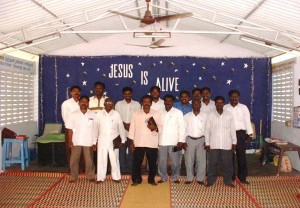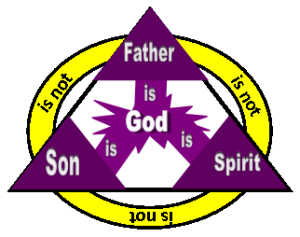Our Beliefs
The Bible
 The Bible is God’s Word and is divinely inspired without error in the original manuscripts. It is the supreme authority for our Christian faith and practice. It is correct to say that both God and men were the authors of the books of the Bible. That is, God guided the human authors in communicating His Word without overriding their individual personalities and writing styles. (2 Tim. 3:16; 2 Pet. 1:21; 1 Cor. 10:11)
The Bible is God’s Word and is divinely inspired without error in the original manuscripts. It is the supreme authority for our Christian faith and practice. It is correct to say that both God and men were the authors of the books of the Bible. That is, God guided the human authors in communicating His Word without overriding their individual personalities and writing styles. (2 Tim. 3:16; 2 Pet. 1:21; 1 Cor. 10:11)
God
There is only one God, the infinite and loving Creator of all things, who eternally exists as Father, Son, and Holy Spirit. While remaining distinct, these three persons are all of one substance, one nature, and one essence. This view of God has been termed the Trinity. (Deut. 6:4; Isa. 45:18; Matt. 28:19-20; Mark 12:29; John 1:1-3; Acts 5:3-4; 1 Cor. 8:4-6; 2 Cor. 3:17)

Jesus Christ
Jesus Christ, as God’s Son, was both fully God and fully human during His time on earth. Through Him all things were created. He was born of a virgin, lived a sinless life, and experienced real human suffering and temptation. His unparalleled life, teaching, miracles, death, and resurrection from the dead make Him uniquely qualified to be the promised Messiah and Savior of the world. Jesus is Lord of all and Head of the Church. (Isa. 9:6-7; 53; John 1:3; John 10:30; John 14:6; Rom. 1:3-4; Col. 1:15-17; 2:9; 2 Tim. 1:10; Heb. 1; 4:15)
Creation
God created all things visible and invisible, including angels. Some angels chose to rebel against God and to follow the lead of the one called Satan. These fallen angels, also known as demons, are real beings. They are active in our world today. (Gen. 1-2; 1 John 3:8; Heb. 1:3; Rev. 12:9)
The first humans, Adam and Eve, were created perfect by God to live in a perfect world. However, their choice to disobey God is what brought imperfection into the world. We have all inherited a fallen nature from them. Since then, all creation has been waiting to be made new. (Gen. 3; Rom. 8:19-21; Rev. 21:1-5)
Mankind’s Condition
 All mankind has the spiritual problem of self-centeredness and disobedience to God, which results in separation from God. This problem is a (moral) failure on mankind’s part to live up to God’s perfect standard. This problem, called “sin”, involves anything which is contrary to God’s character and nature. We are sinners by nature and by choice. Sin is the root cause of all evil, such as crime, social injustice, poverty, oppression, and racism. Since God is the source of all life, our sin leaves us in a state of judgment and death. All people have sinned, and all will die. (Rom. 3:23;Rom. 5:12-21;Rom. 6:23; 1 John 3:4)
All mankind has the spiritual problem of self-centeredness and disobedience to God, which results in separation from God. This problem is a (moral) failure on mankind’s part to live up to God’s perfect standard. This problem, called “sin”, involves anything which is contrary to God’s character and nature. We are sinners by nature and by choice. Sin is the root cause of all evil, such as crime, social injustice, poverty, oppression, and racism. Since God is the source of all life, our sin leaves us in a state of judgment and death. All people have sinned, and all will die. (Rom. 3:23;Rom. 5:12-21;Rom. 6:23; 1 John 3:4)
Salvation
God, in His love, provided the only solution to the problem of sin. Christ’s physical death on the cross made the forgiveness of sins possible for every person and for all peoples, both Jew and Gentile. As the perfect sacrifice, His death in our place paid for the sins of the whole world, thus enabling us to be saved from judgment and to receive gift of eternal life. Jesus physically rose from the dead, securing for believers the forgiveness of sin and the victory over death. Because of Christ’s resurrection, believers will also have their bodies raised in a new glorified state, though first, most physically die. Moreover, believers will never experience spiritual death and separation from God. (John 3:16; 1 John 2:2; Rom. 4:25; 6:5,23; 1 Cor. 15:1-4, Cor. 15:26, Cor. 15:54-55; Eph. 2:5; Rev. 20:6)
Receiving the Gift of Salvation
Forgiveness of sin (justification) is available for everyone because of the grace of God. However, one’s salvation must be individually received by repenting of sins and believing in Christ and His death, resurrection, ascension, and second return. Good works cannot save a person; but after a believer is saved, good works should result. (Gospel of Matt. 28:18-20; Gospel of Mark 16:16; Gospel of John 3:16; Gospel of Luke 24:45-48 & Luke 2:37-38; 16:30-33; Rom. 3:21-30; Eph. 2:8-10)
Two ordinances that the Lord gave His Church to be practiced on a regular basis are Water Baptism and Communion.
 Baptism is an act of obedience to Christ’s command, and it serves as a testimony of the repentant believer’s identification with Christ. We believe and practice baptism by immersion. (Matt. 28:18-20; Acts 2:37-38,Acts 8:36-39, Acts 16:31-34,Acts 22:13-16; Rom. 6:3,4; 1 Cor. 12:12-13; Gal. 3:26-29)
Baptism is an act of obedience to Christ’s command, and it serves as a testimony of the repentant believer’s identification with Christ. We believe and practice baptism by immersion. (Matt. 28:18-20; Acts 2:37-38,Acts 8:36-39, Acts 16:31-34,Acts 22:13-16; Rom. 6:3,4; 1 Cor. 12:12-13; Gal. 3:26-29)
Communion is a time when believers look back at the cross, forward to the return of Christ, and then inward to see how they are applying the grace of God to their lives. This act was valued so highly that the New Testament church practiced it regularly. (Matt. 26:26-29; Acts 2:42, Acts 2:46, Acts 20:7; 1 Cor. 10:16-17, 11:23-34)
The Church
The universal Church is one in Christ, being made up of the redeemed from every people, nation, tribe, and language. (Matt. 28:19-20; Acts 14:23; Eph. 3:10; 5:25-32; Rev. 5:9; 19:7-8)
The local church is made up of believers living in community together, which is a visible expression of the unity and love that only Christ can bring. The church is described in the New Testament as Christ’s body, reflecting God’s intention. (John 13:34-35; John 17:22-23; 1 Cor. 12-14; Eph. 4:1-6)
The Spiritual Life
The indwelling and empowering presence of the Holy Spirit is guaranteed in the life of every believer upon becoming a new creation in Christ. (John 14:16-17; 1 Cor. 12:13; Eph. 1:13-14; 2 Cor. 5:17; Tit. 3:5)
Because believers in Christ are new creations, we ought to live godly and fruitful lives. Thus, growth in holiness (sanctification) and loving service are to be a normal way of life for every believer. (Rom. 12:1-2; Gal. 5:16-26; Col. 3:1-11; Tit. 2:11-12)
The Final Judgment
Jesus Christ, as King of kings and Lord of lords, will visibly return to the earth in the same way He departed; and He will come to bring judgment, resulting in an eternal paradise for the saved and eternal punishment in hell for Satan, demons, and the unsaved. (Matt. 24-25; Dan. 12:1-2; Matt. 10:28; Phil. 3:20-21; 2 Thess. 1:6-10; Tit. 2:12-14; Rev. 1:7; Rev. 1:20;)
